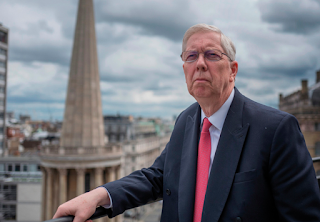The outgoing BBC chairman, Sir David Clementi, says of the Corporation:
We are one of the very few British institutions to be seen as world class... it would be a colossal act of national self-harm if regulators or governments were to take steps which diminished the role of the BBC.
I don't know about you, but that struck me as a 'very BBC' statement, in that "we are one of the very few British institutions to be seen as world class" is such a typically negative thing to say about our country. It seems to embody the BBC's whole outlook.
We have many of the world's top-ranking universities, many world-beating scientific laboratories and medical research centres, many of the world's greatest museums and galleries and theatre companies, sports tournaments (the Premiership, Wimbledon) not to mention the Royal Family, our armed services, our Parliament, etc, etc.
And, Sir David, look at this list of UK Nobel Prize winners in the past decade alone:
- Sir John Bertrand Gurdon (2012, physiology/medicine) - discovery that mature cells can be reprogrammed to become pluripotent
- Michael Levitt (2013, chemistry) - development of multiscale models for complex chemical systems
- Peter Higgs (2013, physics) - theoretical discovery of a mechanism that contributes to the understanding of the origin of mass of subatomic particles
- John O'Keefe (2014, physiology/medicine) - discoveries of cells that constitute a positioning system in the brain
- Angus S. Deaton (2015, economics) - analysis of consumption, poverty, and welfare
- J. Fraser Stoddart (2016, chemistry) - design and synthesis of molecular machines
- Oliver Hart (2016, economics) - contributions to contract theory
- David Thouless (2016, physics) - theoretical discoveries of topological phase transitions and topological phases of matter
- Duncan Haldane (2016, physics) - theoretical discoveries of topological phase transitions and topological phases of matter
- Michael Kosterlitz (2016, physics) - theoretical discoveries of topological phase transitions and topological phases of matter
- Richard Henderson (2017, chemistry) - development of cryo-electron microscopy for the high-resolution structure determination of biomolecules in solution
- Kazuo Ishiguro (2017, literature)
- Gregory P. winter (2018, chemistry) - work using the phage display method for the directed evolution of antibodies
- M. Stanley Whittingham (2019, chemistry) - development of lithium-ion batteries
- Peter J. Ratcliffe (2020, physiology/medicine) - discoveries of how cells sense and adapt to oxygen availability

No comments:
Post a Comment
Note: only a member of this blog may post a comment.